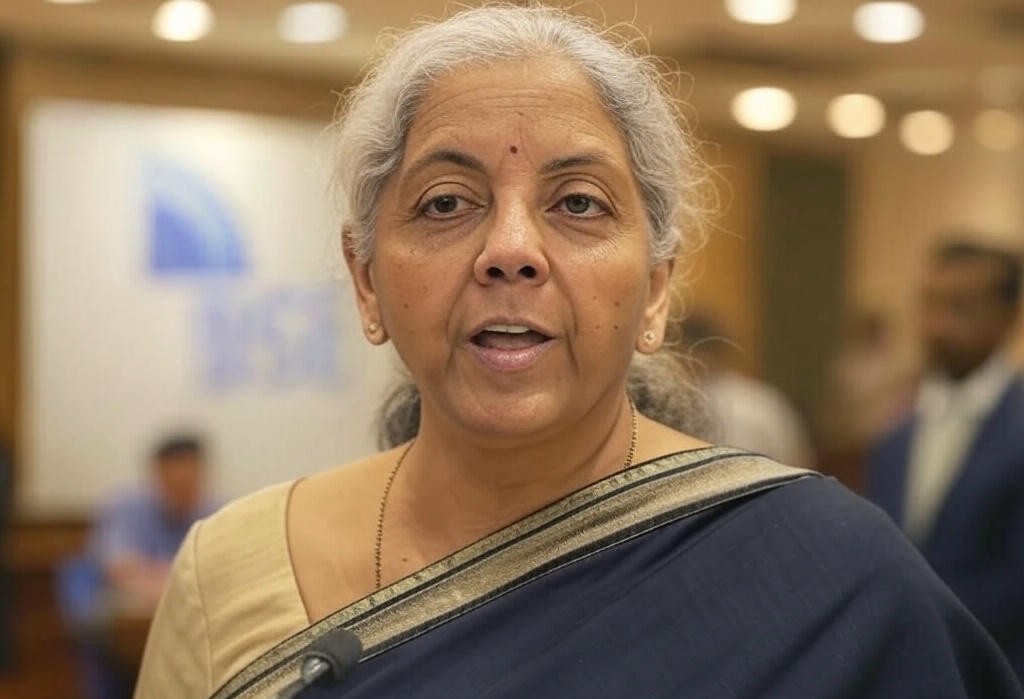
India’s financial markets have shown remarkable strength even as the world faces economic uncertainties. At the 150th anniversary celebration of the Bombay Stock Exchange (BSE) Finance Minister Nirmala Sitharaman spoke about this resilience. She highlighted the challenges posed by global “tariff wars” and expressed confidence in India’s ability to handle disruptions through smart and flexible policies. Her remarks combined with the Reserve Bank of India’s (RBI) recent interest rate cut signal a strong strategy to support economic growth despite pressures from international trade tensions particularly from the United States.
India’s Financial Markets: A Pillar of Strength
India’s financial markets have grown significantly over the years becoming a key driver of the nation’s economy. The BSE one of the oldest stock exchanges in the world has played a central role in this growth. During its 150th anniversary Sitharaman praised the BSE for its contribution to India’s financial system. She noted that the markets have shown resilience meaning they can withstand shocks and recover quickly from difficulties. This is crucial at a time when global economies are facing uncertainty due to trade disputes and changing policies.
The Finance Minister emphasized that India’s financial markets are well regulated and adaptable. Strong regulations ensure that investors feel safe while flexibility allows the markets to adjust to new challenges. For example the BSE and other institutions have embraced technology making trading easier and more accessible. This combination of stability and innovation has helped India’s markets remain strong even when other countries face economic troubles.
The Threat of Global Tariff Wars
One of the biggest challenges Sitharaman mentioned is the risk of “tariff wars.” A tariff war happens when countries impose high taxes, or tariffs on goods imported from other nations. These taxes make imported products more expensive which can disrupt trade and hurt economies. Recently the United States has been increasing tariffs on goods from various countries including India. This creates pressure on Indian businesses that export to the U.S. as their products become costlier for American buyers.
Tariff wars can have a ripple effect. They can raise prices for consumers slow down trade and reduce economic growth. For a country like India which is working to boost its exports and manufacturing these trade barriers are a serious concern. Sitharaman acknowledged this risk but remained optimistic. She believes India’s government and financial institutions are prepared to tackle these challenges through quick and effective policy changes.
Policy Agility: India’s Key Weapon
Sitharaman’s confidence comes from India’s ability to adapt its policies to changing situations. This “policy agility” means the government can make decisions quickly to protect the economy. For instance if tariffs make Indian exports less competitive the government might offer support to affected industries or negotiate trade deals with other countries. This flexibility is vital in a fast changing global environment.
The Finance Minister also highlighted the importance of teamwork between the government the RBI and financial institutions like the BSE. By working together they can create policies that keep the economy stable and encourage growth. This collaborative approach has helped India navigate past challenges such as the global financial crisis and the economic slowdown caused by the COVID-19 pandemic.
RBI’s Interest Rate Cut: A Boost for Growth
To support economic growth amid global pressures the RBI recently lowered interest rates. An interest rate cut makes borrowing cheaper for businesses and individuals. This encourages companies to invest in new projects hire more workers and expand their operations. For consumers lower rates mean cheaper loans for homes cars or other purchases which boosts spending and helps the economy grow.
Sitharaman welcomed this move as it comes at a time when U.S. tariff pressures could slow down India’s exports. By making borrowing easier the RBI is helping businesses stay competitive and keep the economy moving forward. This decision shows how India is using monetary policy changes in interest rates and money supply to counter global challenges.
Looking Ahead: A Confident Future
India’s financial markets are at a critical point. While global tariff wars and trade disruptions pose risks the country is well-equipped to handle them. Sitharaman’s speech at the BSE’s 150th anniversary was a reminder of India’s strengths a resilient financial system, flexible policies and a proactive central bank. These factors give India the tools to navigate uncertainties and continue its growth journey.
The road ahead may not be easy but India’s track record shows it can overcome challenges. By staying adaptable and working together the government, RBI and financial institutions can ensure the economy remains strong. For investors, businesses and citizens this is a message of hope and confidence in India’s ability to thrive in a complex global landscape.
In conclusion Nirmala Sitharaman’s remarks highlight India’s determination to face global economic challenges head on. With a robust financial system and smart policies India is ready to navigate the stormy waters of tariff wars and trade disruptions. The RBI’s interest rate cut is a step in the right direction supporting growth and stability. As India celebrates milestones like the BSE’s 150th anniversary it looks to the future with optimism ready to build a stronger and more resilient economy.
